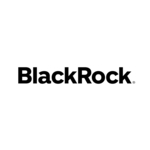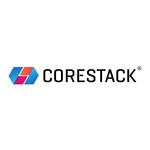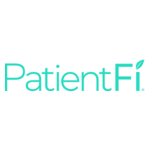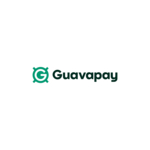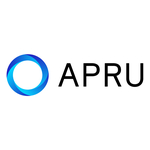Health Intelligent Virtual Assistant Market Predictions: CAGR of 36.8%, Reaching USD 20,901.0 Mn by 2032 | Insights by Dimension Market Research
In the coming years, the Global Health Intelligent Virtual Assistant Market is expected to show significant growth driven by development in AI, automation, and natural language processing. Integration with wearable devices and smart speakers, along with higher demand for remote healthcare services, will further drive market expansion. In addition, a focus on data privacy and interoperability will shape market dynamics and adoption trends.
New Jersey, April 24, 2024 (GLOBE NEWSWIRE) — Overview:
The Global Health Intelligent Virtual Assistant Market size was valued USD 1,242.2 million by 2023 and is further anticipated to reach USD 20,901.0 million by 2032 according to Dimension Market Research. The market is anticipated to register a CAGR of 36.8% from 2024 to 2032.
An Intelligent Virtual Assistant (IVA) is specialized software using artificial intelligence (AI) & natural language processing (NLP) to imitate human-like interactions. In healthcare, these assistants support & assist healthcare workers and patients.
By products, the Health Intelligent Virtual Assistant Market is categorized into chatbots and smart speakers. The dominanted chatbot segment in 2023 is widely used applications like Florence and Sensely, which assist healthcare professionals and patients. Smart speakers, supporting automated speech recognition, are expected to experience rapid growth, particularly in medical counseling and therapy for issues like loneliness and depression.
The end-users of the Health Intelligent Virtual Assistant Market include payers, providers, and other segments, with providers leading in revenue share in 2023 and expecting rapid growth. Providers offer services like appointment scheduling & medical diagnosis assistance, driven by the adoption of electronic health records and the demand for seamless integration. Also, payers, responsible for maintaining & securing patient records, are anticipated to experience significant growth, indicating substantial opportunities in the forecast period.
Click to Request Sample Report and Drive Impactful Decisions: https://dimensionmarketresearch.com/report/health-intelligent-virtual-assistant-market/request-sample/
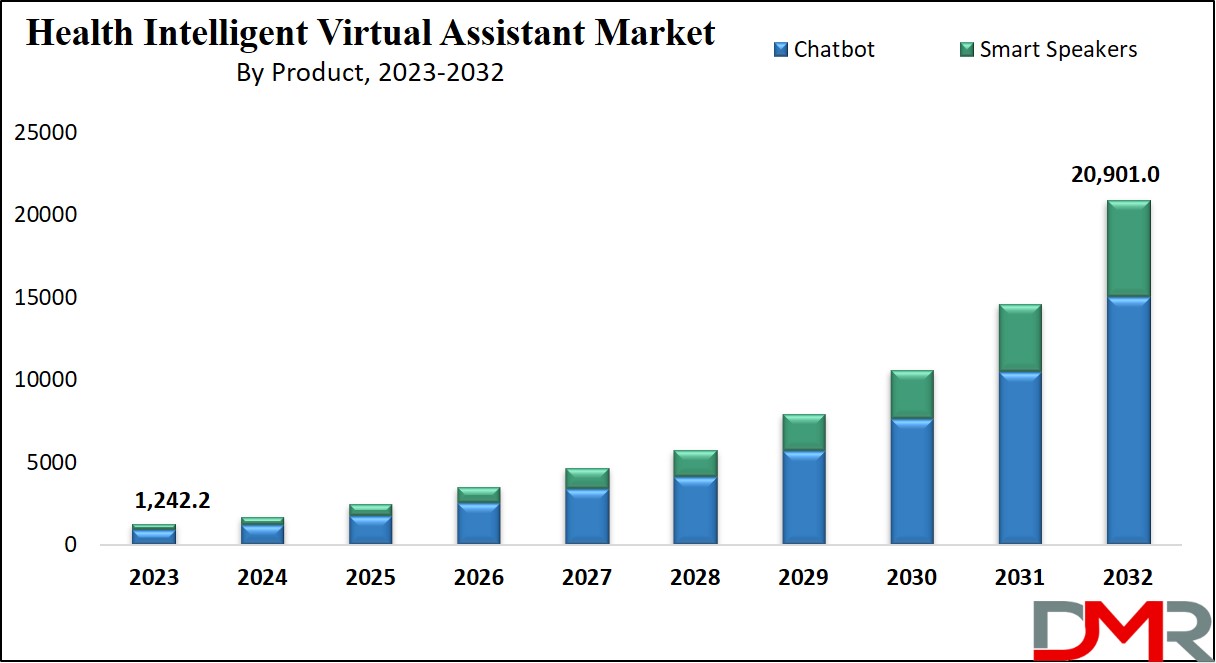
Important Insights
- The global healthcare intelligent virtual assistant market is expected to grow by USD 19,658.8 million by 2032 from 2024 with a CAGR of 36.8% during the same forecasted period i.e. 2024 to 2032.
- The leading chatbot segment in 2023 includes widely used applications like Florence and Sensely, helping healthcare professionals & patients. Further, Smart speakers anticipate rapid growth in medical counseling for issues like loneliness and depression.
- The text-to-speech segment dominated revenue in 2023, allowing computer understanding of human speech. Automation, deep learning, & AI advancements enhance virtual assistant utilization. Also, automatic speech recognition anticipates rapid growth.
- Providers lead in revenue in 2023 and expect rapid growth, offering services like appointment scheduling & medical diagnosis assistance. Further, payers anticipate significant growth, ensuring patient record maintenance and security.
- North America dominates the market in 2023 with a 39.2% revenue share, driven by widespread IoT adoption and smartphone use. Asia Pacific, notably China and India, anticipates significant growth.
Global Health Intelligent Virtual Assistant Market: Trends
- Focus on Natural Language Processing (NLP) and Conversational AI: Recent developments in natural language processing (NLP) and conversational AI have allowed IVAs to better understand and respond to user queries in natural language, which focuses on the importance of human-like interactions and context-aware responses, improving the user experience and effectiveness of IVAs in healthcare settings.
- Integration of Voice Assistants and Smart Speakers: There’s a major trend towards integrating IVAs with popular voice assistants and smart speakers like Amazon Alexa, Google Assistant, and Apple Siri, which allows patients to have healthcare information, schedule appointments, and manage their health using voice commands, thereby enhancing accessibility and convenience.
- Expansion of Remote Patient Monitoring: With the high adoption of telehealth and remote patient monitoring solutions, IVAs are being used to support remote healthcare interactions and monitor patient health remotely, which is driven by the need to manage chronic conditions, monitor post-operative care, and allow continuity of care outside traditional healthcare settings.
- Emphasis on Data Privacy and Security: Given the sensitive nature of healthcare data, there’s a growing focus on data privacy and security within the IVA market. Healthcare organizations are using robust security measures and compliance standards to protect patient information and ensure regulatory compliance. In addition, developments in encryption technologies and blockchain solutions are being explored to improve the security of healthcare data exchanged through IVAs.
Health Intelligent Virtual Assistant Market: Competitive Landscape
In the global health intelligent virtual assistant market experiences intense competition prompts companies to employ strategies like introducing innovative products, engaging in strategic acquisitions, & forming partnerships to expand their global presence. This dynamic encourages ongoing improvement and a broader reach, ensuring effective solutions for healthcare needs.
Some of the major players in the market include CSS Corp, eGain Corp, Microsoft Corp, Virgin Pulse, Next IT Solutions, Kognito, and more.
Some of the prominent market players:
- CSS Corp
- eGain Corp
- Microsoft Corp
- CodeBaby Corp
- Medrespond LLC
- Welltok Inc
- Virgin Pulse
- Next IT Solutions
- Kognito
- Verint Systems
- Other Key Players
Transform your business approach with strategic insights from our report. Get in touch to request our brochure today at https://dimensionmarketresearch.com/report/health-intelligent-virtual-assistant-market/download-reports-excerpt/
Health Intelligent Virtual Assistant Market Scope
| Report Highlights | Details |
| Market Size (2023) | USD 1,242.2 Mn |
| Forecast Value (2032) | USD 20,901.0 Mn |
| CAGR (2024-2032) | 36.8 % |
| Leading Region in terms of Revenue Share | North America |
| Percentage of Revenue Share by Leading Region | 39.2% |
| Historical Data | 2017 – 2022 |
| Forecast Data | 2025 – 2032 |
| Base Year | 2023 |
| Estimate Year | 2024 |
| Segments Covered | By Product, By Technology, By End User |
| Regional Coverage | North America, Europe, Asia Pacific, Latin America, Middle East & Africa (MEA) |
Regional Analysis
North America led the Health Intelligent Virtual Assistant Market in 2023, securing a substantial 39.2% revenue share, due to broad IoT adoption and extensive smartphone use. The region’s growth is further fueled by the increasing need for robust healthcare infrastructure, addressing shortages in healthcare professionals, especially in the US. In addition, the Asia Pacific region is expected to have significant growth, mainly in China & India, as they actively embrace health intelligent virtual assistants to tackle healthcare challenges arising from population growth and a shortage of qualified medical professionals.
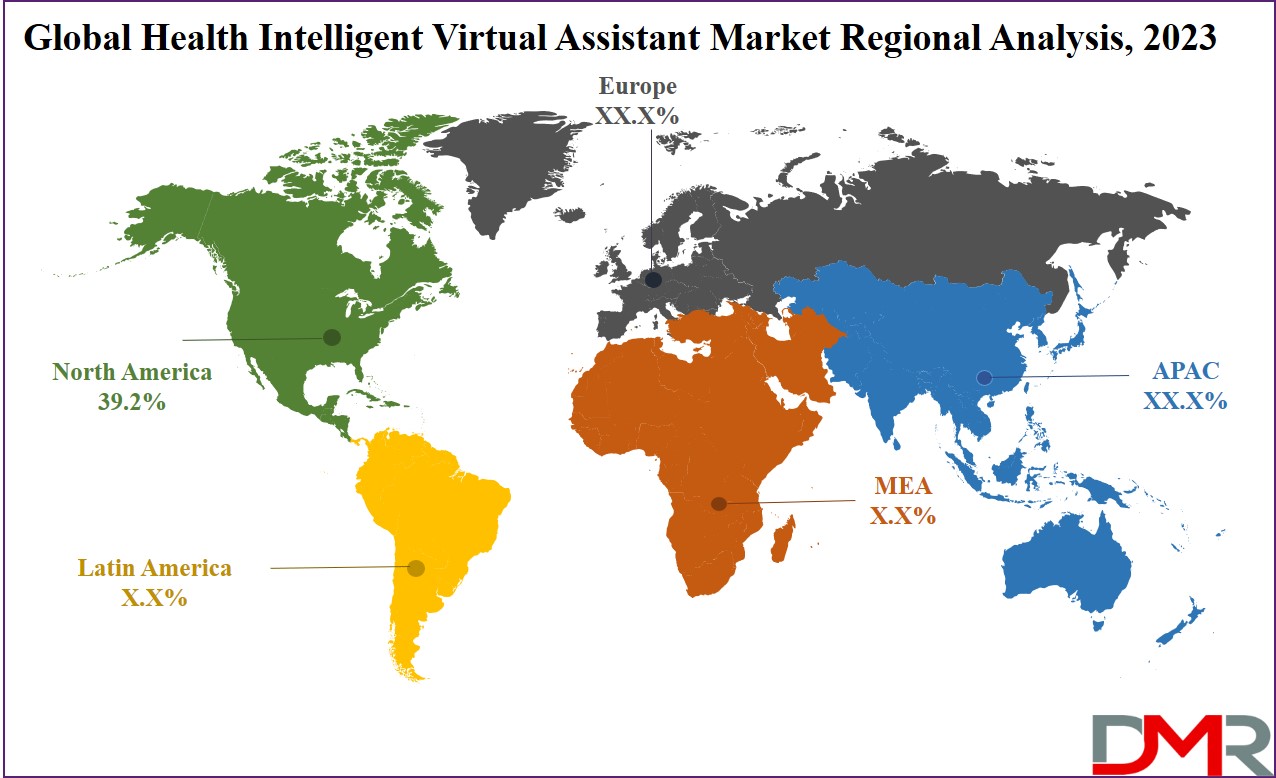
By Region
North America
- The U.S.
- Canada
Europe
- Germany
- The U.K.
- France
- Italy
- Russia
- Spain
- Benelux
- Nordic
- Rest of Europe
Asia-Pacific
- China
- Japan
- South Korea
- India
- ANZ
- ASEAN
- Rest of Asia-Pacific
Latin America
- Brazil
- Mexico
- Argentina
- Colombia
- Rest of Latin America
Middle East & Africa
- Saudi Arabia
- UAE
- South Africa
- Israel
- Egypt
- Rest of MEA
Purchase the Competition Analysis Dashboard Today: https://dimensionmarketresearch.com/checkout/health-intelligent-virtual-assistant-market/
Segment Analysis:
The text-to-speech technology led the market in 2023, allowing computers to comprehend human speech and quickly convert it into text, which is driven by automation, deep learning, and AI, and is highly used in virtual assistant products by industry giants like Amazon, Apple, and Google. Further, the automatic speech recognition segment is expected to rapidly growth, mainly in medical counseling, where therapists use smart speakers and chatbots to improve patient interaction, which not only recognizes words and alphabets but also verifies individual identities, contributing to its higher adoption and prominence in the market forecast.
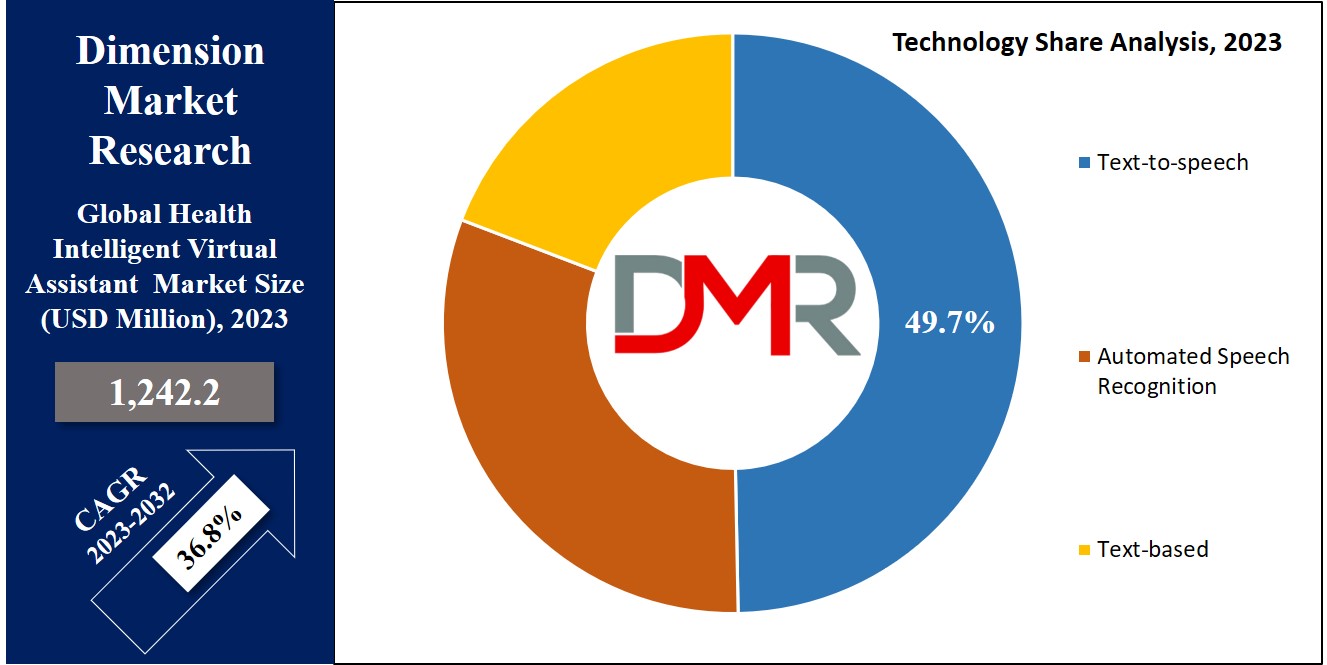
Health Intelligent Virtual Assistant Market Segmentation
By Product
- Chatbot
- Smart Speakers
By Technology
- Automated Speech Recognition
- Text-to-Speech
- Text-based
By End User
- Provider
- Payers
- Others
Global Health Intelligent Virtual Assistant Market: Driver
- Increasing Adoption of AI in Healthcare: With the development of artificial intelligence (AI), healthcare providers are highly adopting IVAs to streamline patient interactions, automate administrative tasks, and improve overall operational efficiency.
- Rising Demand for Remote Healthcare Services: The increase in demand for remote healthcare services, mainly during the COVID-19 pandemic, is driving the adoption of IVAs. These virtual assistants allow remote patient monitoring, telemedicine consultations, and personalized health recommendations, thereby expanding access to healthcare.
- Focus on Patient Engagement and Experience: Healthcare organizations are giving importance to patient engagement and experience to enhance outcomes and satisfaction. IVAs play a major role in delivering personalized, timely, and interactive support to patients, improving their overall healthcare experience.
- Cost Reduction and Operational Efficiency: IVAs offer low-cost solutions for healthcare providers by automating routine tasks like appointment scheduling, billing inquiries, and medication reminders. By minimizing administrative burdens and streamlining processes, IVAs help healthcare organizations achieve better operational efficiency and cost savings.
Global Health Intelligent Virtual Assistant Market: Restraints
- Data Privacy and Security Concerns: The collection and storage of sensitive healthcare data by IVAs creates major privacy and security concerns. Healthcare organizations and patients together are cautious about the potential risks of data breaches, unauthorized access, and misuse of personal health information, which may impact higher adoption.
- Interoperability Challenges: Integrating IVAs with current healthcare systems and electronic health records (EHRs) can be complex due to interoperability challenges. Incompatibility issues between different systems and data formats may limit the smooth exchange of information, impacting the efficiency and effectiveness of IVAs in healthcare workflows.
- Accuracy and Reliability of Diagnosis: While IVAs have the potential to help in clinical decision-making, concerns remain regarding the accuracy and reliability of their diagnoses. The dependency on algorithms and machine learning models may lead to errors or misinterpretations, creating doubts among healthcare professionals and patients about the trustworthiness of IVAs in diagnosing medical conditions.
- Regulatory Compliance and Legal Frameworks: The healthcare industry is subject to strict regulatory requirements and legal frameworks governing the use of technology, patient data, and medical practices. Compliance with regulations like HIPAA (Health Insurance Portability and Accountability Act) and GDPR (General Data Protection Regulation) creates challenges for IVAs, demanding adherence to strict standards for data protection, consent management, and patient rights, which may constrain market growth.
Click to Request Sample Report and Drive Impactful Decisions: https://dimensionmarketresearch.com/report/health-intelligent-virtual-assistant-market/request-sample/
Global Health Intelligent Virtual Assistant Market: Opportunities
- Expansion of Personalized Healthcare Services: IVAs provide opportunities for delivering highly personalized healthcare services customized to individual patient needs. Through data analysis and machine learning algorithms, IVAs can provide customized health recommendations, treatment plans, and lifestyle interventions, thus allowing patients to take control of their health.
- Integration with Wearable Devices and IoT: Combining IVAs with wearable devices and Internet of Things (IoT) technology creates opportunities for real-time health monitoring and data collection. By using data from wearable devices like fitness trackers and smartwatches, IVAs can provide proactive health insights and intervene in case of potential health risks or emergencies.
- Enhanced Clinical Decision Support: IVAs can act as valuable tools for healthcare professionals by providing live clinical decision support. By inspecting patient data, medical histories, and evidence-based guidelines, IVAs can help clinicians in diagnosing conditions, selecting appropriate treatment options, and monitoring patient progress, thereby enhancing clinical outcomes and minimizing medical errors.
- Expansion into Emerging Markets: The growth adoption of digital health technologies in emerging markets provides major growth opportunities for IVAs. As these regions look to improve healthcare access and affordability, IVAs can play an important role in delivering remote healthcare services, expanding telemedicine initiatives, and addressing healthcare disparities through d innovative solutions personalized to local needs and preferences.
Recent Developments in the DeepFake AI Market
- November 2023: Healthcare AI startup Hyro collaborates with patient communications platform Artera to introduce Artera Care Assist, a chatbot-style assistant for providers’ websites that is available to over 700 customers.
- September 2023 Healthcare leaders received a sneak peek at MEDITECH’s latest AI initiatives, expanding their partnership with Google Cloud for generative AI capabilities.
- September 2023: Chilean medical technology leader, Mediclic, unveiled Cecilia, Chile’s first AI-powered virtual medical assistant, offering users guidance & healthcare support.
- March 2023: Philips launched Virtual Care Management, a suite assisting healthcare providers in fostering meaningful patient connections while reducing unnecessary ER visits, & efficiently managing chronic illnesses.
Browse More Related Reports
- Submarine Cables Market is expected to reach a value of USD 30.8 billion in 2023, and it is further anticipated to reach a market value of USD 52.7 billion by 2032 at a CAGR of 6.1%.
- HVAC Systems Market is expected to reach a value of USD 166.8 billion in 2023, and it is further anticipated to reach a market value of USD 275.0 billion by 2032 at a CAGR of 5.7%.
- Generative AI Market is expected to reach a value of USD 14.9 billion in 2023, and it is further anticipated to reach a market value of USD 266.0 billion by 2032 at a CAGR of 37.8%.
- Generative AI in Financial Services Market is expected to reach a value of USD 1,156.9 million in 2023, and it is further anticipated to reach a market value of USD 11,527.4 million by 2032 at a CAGR of 29.1%.
- Generative AI in E-Commerce Market is expected to reach a value of USD 760.9 million in 2023, and it is further anticipated to reach a market value of USD 2,796.4 million by 2032 at a CAGR of 15.6%.
- Earthmoving Equipment Market is expected to reach a value of USD 82.5 billion in 2023, and it is further anticipated to reach a market value of USD 102.9 billion by 2032 at a CAGR of 2.5%.
- Wireless Network Security Market is expected to reach a value of USD 28.0 billion in 2023, and it is further anticipated to reach a market value of USD 83.9 billion by 2032 at a CAGR of 13.0%.
- Patch Management Market is expected to reach a value of USD 770.4 million in 2023, and it is further anticipated to reach a market value of USD 1,938.3 million by 2032 at a CAGR of 10.8%.
- Security Information and Event Management Market (SIEM) is expected to reach a value of USD 4.7 billion in 2023, and it is further anticipated to reach a market value of USD 16.7 billion by 2032 at a CAGR of 15.0%.
- Managed Security Services Market is expected to reach a value of USD 32.9 billion in 2023, and it is further anticipated to reach a market value of USD 97.1 billion by 2032 at a CAGR of 12.8%.
- Data Centric Security Market is expected to reach a value of USD 5.7 billion in 2023, and it is further anticipated to reach a market value of USD 42.4 billion by 2032 at a CAGR of 25.1%.
- Cybersecurity Mesh Market is expected to reach a value of USD 1.7 billion in 2023, and it is further anticipated to reach a market value of USD 18.4 billion by 2032 at a CAGR of 30.2%.
- Container Security Market is expected to reach a value of USD 2.1 billion in 2023, and it is further anticipated to reach a market value of USD 16.2 billion by 2032 at a CAGR of 25.2%.
- Anomaly Detection Market is expected to reach a value of USD 5.3 billion in 2023, and it is further anticipated to reach a market value of USD 21.9 billion by 2032 at a CAGR of 17.1%.
- Natural Language Processing Market is expected to reach a value of USD 21.0 billion in 2023, and it is further anticipated to reach a market value of USD 176.0 billion by 2032 at a CAGR of 26.6%.
About Dimension Market Research (DMR):
Dimension Market Research (DMR) is a market research and consulting firm based in India & US, with its headquarters located in the USA (New York). The company believes in providing the best and most valuable data to its customers using the best resources analysts into work, to create unmatchable insights into the industries, and markets while offering in-depth results of over 30 industries, and all major regions across the world. We also believe that our clients don’t always want what they see, so we provide customized reports as well, as per their specific requirements to create the best possible outcomes for them and enhance their business through our data and insights in every possible way.
CONTACT: Global Business Development Team United States 957 Route 33, Suite 12 #308 Hamilton Square, NJ-08690 Phone No.: +1 732 369 9777, +91 88267 74855 [email protected]































